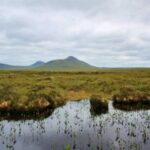The Highlands and Islands of Scotland are home to a range of diverse wild habitats with unique biodiversity attributes, many of which represent the last remnants of pristine environments left within the UK.
This includes blanket bog, a globally rare type of peatland that cloaks undulating landscapes in cool, high-latitude, hyperoceanic regions and sub-polar islands. In good condition, blanket bog play critical roles in the regulation of water and in the local, regional and global regulation of climate, through sequestration and storage of carbon. With around 1.8M ha, representing >10% of the world’s blanket bog, Scotland has a key role in the global stewardship of this biome, and a world leader in large-scale restoration interventions. With £250M pledged by the Scottish Government until 2030 to support the restoration of degraded peatlands across Scotland, the underpinning science that CWC seeks to provide is more important than ever.

The ERI Carbon Water and Climate team benefits from unrivalled access to the Flow Country peatlands of Caithness and Sutherland: covering 4000 km2, they represent largest expanse of blanket bog in Europe and a site of global significance. There, we aim to deploy in situ data collection at a range of scales to complements the development of novel remote-sensing monitoring tools. Our research also aims to better understand how these large-scale land use changes alter the freshwater rivers that flow out of the peatlands and into the Ocean. These rivers ultimately link the terrestrial and the marine systems, but also play a vital part for the Highland economy through salmon fishing.
We will continue to seek to influence the development of better practices and sustainable land management decisions by collaborating with ERI’s new “Environment, Economy and Society” theme. This will allow us to incorporate the societal and economic impacts of land use change to our increased understanding of the environmental responses of the key Highland ecosystems.
Our strategic priorities for the CWC are as follows:
- Peatlands in a changing world.
- Using a combination of field-based monitoring, controlled experiments and remote-sensing to assess how peatlands respond to the compounding effects of land use and climate change, including droughts and wildfires
- Coordinating of the Flow Country Research Hub, a network of >60 organisations and stakeholders with an interest in the Flow Country peatlands to facilitate access to researchers from across the UK and abroad
- Organic matter from source to sink.
- Understanding the fate of organic matter as it leaves the terrestrial pools and enters the freshwater rivers and estuaries by combining field sampling, analytical chemistry and improving our estimates of greenhouse gases from oceans using remote-sensing technology
- Using analytical chemistry to assess how land use change on peatland (restoration, wind farm construction) alters water quality in freshwater systems (in collaboration with ECEH)
- Sustainable land use
- Developing of an understanding of the economic and societal impacts linked with peatland degradation, restoration and conservation both in a Scottish (e.g., Highland estates, traditional land use and its cultural importance) as well as an international context.
The Flow Country Research Hub is a network of researchers and stakeholders interested by peatland research in the Flow Country, the vast expanse of blanket bog spreading across Caithness and Sutherland in the North of Scotland. It was launched during the first Flow Country Research Conference, held in Thurso in October 2012.
The Flow Country Research Hub aims to establish the Flow Country as a UK focal point of peatland science addressing contemporary issues such as climate change, biodiversity, resource management and sustainability.
A wide range of peatland research projects are taking place in the Flow Country, most of which are collaborative in nature. This in in line with the long-term aspiration of the network, which are to:
– Provide and maintain infrastructures which promote international collaborations, student placements, visiting researchers and which enable sustainable, world-class research to take place in the Flow Country;
– Improve the integration between scientists, landowners, practitioners, governance bodies and policy makers, to help deliver restoration objectives in Scotland;
– Develop a better platform for the provision of outreach and knowledge exchange activities making research accessible to all
